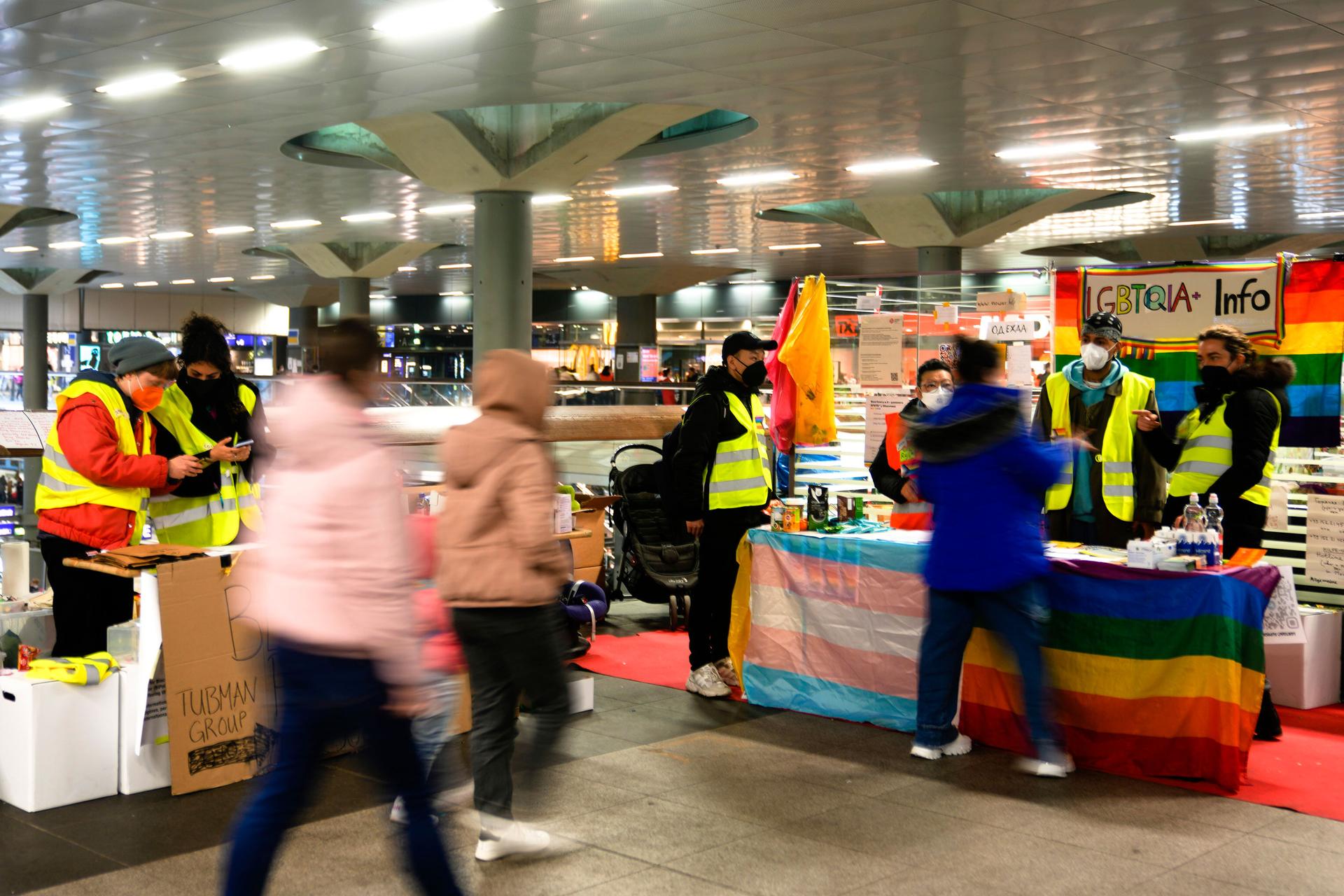When Anastasia Cernova fled from Kyiv in the early days of the war, Berlin’s LGBTQ community was a big part of her decision to travel to Germany after making a split-second choice to jump on an evacuation train.
“I have many friends here in Berlin who are political refugees from Ukraine, Russia and Belarus.”
“I have many friends here in Berlin who are political refugees from Ukraine, Russia and Belarus,” said Cernova, an LGBTQ activist.
After making a gruelling, nonstop three-day journey to the German capital, she immediately began helping other LGBTQ people get to Berlin.
“When I arrived here, I didn’t go for a shower, or to bed,” she said. “I started to help other people because I didn’t want anybody to go through the things that I did. And it was like psychotherapy for me.”
Every day, about 1,500 people from Ukraine arrive in Berlin’s central station.
At least 10 Berlin organizations are now working together to provide new arrivals with information on where to access LGBTQ-friendly accommodation, legal advice and health care.

Volunteers help steer people to a centralized information hub — affixed with rainbow signs — where LGBTQ people can find free food, water and a place to rest.
“People just need to be welcomed and to feel safe and to know there are people like them who know what they need.”
“People just need to be welcomed and to feel safe and to know there are people like them who know what they need,” volunteer Matthias Bröring said.“If a trans person, for example, needs hormones for their treatment, we can provide addresses of doctors who supply that.”
Anyone with concerns about sexually transmitted infections or HIV medication needs can get connected with a nonjudgmental doctor, Bröring said.
Volunteers also help people connect with the wider LGBTQ community in the city.
“In Berlin, we have a big culture of LGBT organizations,” Bröring said. “There’s a lesbian center, there’s a gay center, and they all provide information and help.”

Berlin’s rich LGBTQ history dates back centuries — the first-ever gay magazine was published here in 1896, and in the 1920s, the Schoneberg neighborhood was considered the world’s first gay district.
There are also about 6 million Russian speakers living in Germany, many of whom moved here after the USSR collapsed in the 1990s. In more recent years, the capital has become a relatively safe haven for people from across the region looking to escape homophobia and transphobia.

Svetlana Shaytonova, a spokesperson for Quarteera, an organization of LGBTQ Russian speakers living in Germany, said that she and her colleagues have rallied to help those fleeing Ukraine over the past weeks.
“It’s a very vulnerable situation to be on the border with a lot of people, and you don’t know how they’re going to react to trans people or queer people.”
“It’s a very vulnerable situation to be on the border with a lot of people, and you don’t know how they’re going to react to trans people or queer people,” she said.
Cernova, from Kyiv, said she didn’t have trouble crossing the border. But she said that she knows about a transgender woman who faced challenges because her passport still listed her gender as male.
“They stopped her and started to put the gun to her face and said, ‘Oh, we can kill you because you are a man, you should go to the army,’” she said.
Quarteera has been gathering reports of transphobic incidents at the border. They are also helping to provide safe accommodation — making sure that couples aren’t split up, and ensuring that LGBTQ people can stay in Berlin.
“In Ukraine, it wasn’t possible [for same-sex couples] to register a marriage,” she explained. “So, our job is to make sure that the couples who arrive don’t get allocated to different regions of Germany.”
For many LGBTQ people, Berlin is seen as a safer option than staying in neighboring Poland or Hungary where conservative governments have recently passed various legislation targeting the community.
Related:‘It’s about love’: Kenyan filmmaker says he’ll appeal a government ban on his LGBTQ doc
But Cernovasaid the decision one’s home country to leave is still never easy.
“Germany is really safe for people like us,” she said. “But I miss my home. Sometimes, I wake up and I am thinking about maybe I should go back to Kyiv.”
But for now, the community in Berlin is helping new arrivals feel as welcome as possible.
Our coverage reaches millions each week, but only a small fraction of listeners contribute to sustain our program. We still need 224 more people to donate $100 or $10/monthly to unlock our $67,000 match. Will you help us get there today?
